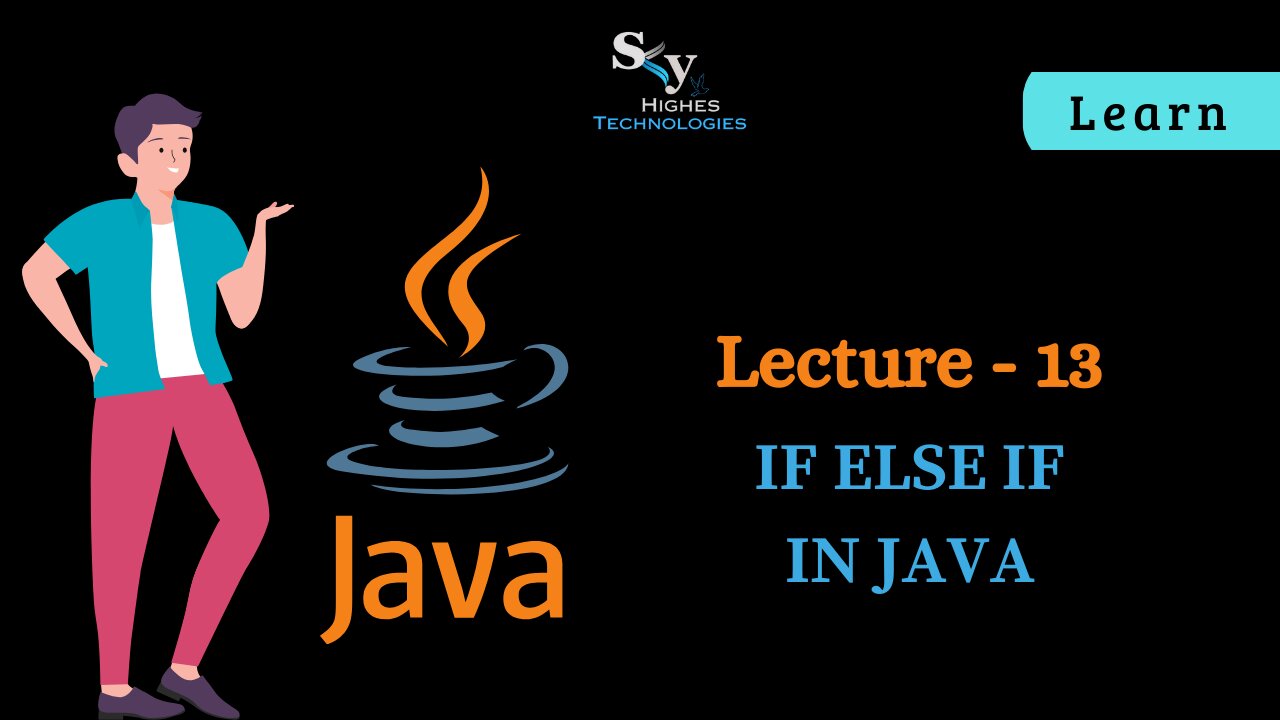Premium Only Content

#13 If Else If in JAVA | Skyhighes | Lecture 13
If-Else-If in Java: The Decision-Making Trio
Think of your Java code as a wise king in a kingdom, facing tough choices based on different situations. The if-else-if statements are the king's advisors, carefully analyzing conditions and suggesting the best course of action.
Let's break down their roles:
King - The if Statement:
Asks the first question: Evaluates a condition (true or false).
Decides the initial path: If the condition is true, the code block within the if statement is executed.
First Advisor - The else if Statement:
Offers alternative scenarios: Presents another condition to be checked if the if condition is false.
Guides the next step: If the else if condition is true, its corresponding code block runs instead of the if block.
Image of wise advisor whispering in the king's earOpens in a new window
satyamparamdheemahi.blogspot.com
wise advisor whispering in the king's ear
Second Advisor - Additional else if Statements (Optional):
More possibilities: You can chain multiple else if statements to consider even more conditions and offer specific responses for each.
Precise decision-making: Each else if acts as a separate advisor, providing a unique path based on its specific condition.
Final Option - The else Statement (Optional):
The catch-all solution: Provides a default code block to be executed if none of the if or else if conditions are met.
Ensures no gaps: Guarantees that the program always takes some action, even if none of the specific conditions apply.
Example:
Java
int score = 75;
if (score >= 90) {
System.out.println("Excellent! You got an A!");
} else if (score >= 80) {
System.out.println("Great job! You got a B!");
} else if (score >= 70) {
System.out.println("Good! You got a C!");
} else {
System.out.println("Keep practicing! You'll improve next time.");
}
Use code with caution. Learn more
Key Points:
Order matters! if comes first, followed by else if statements (in any order), and finally the optional else.
Each else if condition is independently evaluated, only executed if the previous conditions were false.
Use proper indentation for clear readability and to avoid confusion.
Remember: if-else-if statements empower your Java code to make informed decisions based on various scenarios. By mastering them, you'll transform your programs into intelligent beings, responding dynamically to the world around them. So, put on your kingly crown and start building impactful decision-making structures in your Java adventures!
Bonus Tip: Consider using switch-case statements for simpler scenarios with a limited number of distinct conditions.
-
 9:20
9:20
daniellesmithab
1 day ago3 Bad Laws
11.2K5 -
 9:22
9:22
MattMorseTV
16 hours ago $9.09 earnedINDIA just made a BIG MISTAKE.
53.1K51 -
 12:11
12:11
Nikko Ortiz
14 hours agoCrashout 6 Rumble
8.61K2 -
 22:35
22:35
GritsGG
14 hours agoThe KILO is BACK! The Best AR on Warzone FRIES!
16.2K1 -
 2:16:36
2:16:36
Side Scrollers Podcast
18 hours agoStreamer KICKED OUT of Renaissance Fair for Misgendering + Spiderman MELTDOWN | Side Scrollers Live
39.8K7 -
 12:29
12:29
The Pascal Show
1 day ago $1.14 earnedLOCKED IN A DUNGEON?! Parents Arrested After 5 Children Found In 'Dungeon' At Home
9.96K3 -
 LIVE
LIVE
Lofi Girl
2 years agoSynthwave Radio 🌌 - beats to chill/game to
231 watching -
 3:07:24
3:07:24
FreshandFit
9 hours agoPrivileged Nigerian Thinks Women Created Everything: HEATED DEBATE
146K80 -
 5:57:27
5:57:27
SpartakusLIVE
10 hours agoNEW Update - BROKEN Attachment || Viewers REJOICE at the long-awaited Return of Their KING
77.9K -
 2:06:31
2:06:31
TimcastIRL
10 hours agoTrump To Deploy National Guard To Portland, Antifa Has Been WIPED OUT | Timcast IRL
195K169